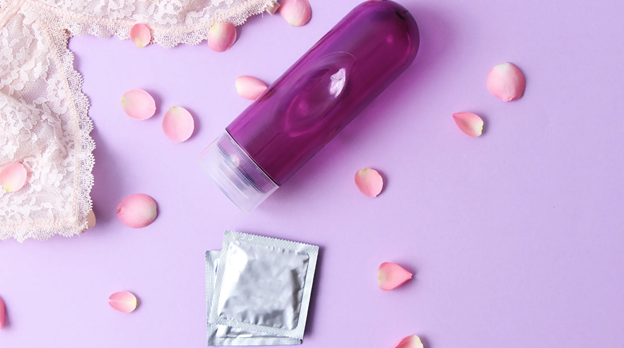Lubrication might not always be top of mind until circumstances dictate its necessity. I confess that I hadn’t always been well-versed in the world of lubes, content with my jar of coconut oil stashed away in a bedside drawer – which, as it turns out, isn’t an ideal lubricant. I used to believe that all personal lubricants were essentially interchangeable, so why concern myself with the specific one I applied to my intimate toys? Little did I know that the ingredients in lubes could have a substantial impact – some are safe for the body, while others should be avoided.
A prevalent misconception is that lubricants are only for addressing sexual difficulties. However, the truth is that anyone can benefit from using lube at any time. The right lube can intensify pleasure, prevent chafing during extended sexual activity, but it’s worth noting that certain formulations might contain elements that could potentially raise the risk of yeast infections or other health issues.
Lubes come in various forms, and navigating the plethora of options available can be overwhelming. Before embarking on a shopping spree at a local adult store or online, it’s crucial to understand the purpose of lube, which ingredients are suitable for your sexual activities, and which ones should be avoided.
Exploring the Three Main Lube Types: Oil, Water, and Silicone
Though lubricants can undoubtedly enhance most sexual encounters, not all lubes are created equal. Joshua Zeichner, the director of cosmetic and clinical research at New York City’s Mount Sinai Hospital, categorizes most lubricants into three primary groups: oil-based, water-based, and silicone-based. However, Zeichner notes that while they serve similar purposes, each category requires specific considerations based on individual needs.
Water-based Lubricants
When making your selection, take into account the type of sexual activity you’ll engage in and whether you’ll use condoms or incorporate sex toys. Water-based lubes are generally easy to find and often come with affordable price tags in drugstores. Brands like Astroglide and K-Y offer these options. Water-based lubes are safe for use with sex toys, latex condoms, and won’t stain fabrics, making them versatile for vaginal or anal intercourse.
Oil-based Lubricants
On the other hand, water-based varieties tend to dry out quickly, boast lengthy ingredient lists, and aren’t suitable for activities like sex in the shower or underwater. While oil-based lubes tend to last longer compared to their water-based counterparts, they come with a caveat. According to Zeichner, oil-based lubes might weaken latex, making them less compatible with condoms.
Silicone-based Lubricants
Silicone-based lubes also offer extended endurance compared to water-based alternatives, but they might cause discomfort for those with sensitive skin and can potentially damage silicone toys.
Ingredients to Avoid in Lubricants (and Reasons Why)
While different lubes cater to different needs, certain ingredients could pose issues for some individuals, as advised by experts. Some popular and easily accessible lube brands often include ingredients that are best avoided. Just as you’d inspect the labels of your food, it’s essential to familiarize yourself with lube ingredients. Just as you wouldn’t buy a cheap, unverified sex toy from Amazon, it’s equally important to ensure that the lube you choose won’t jeopardize your health or intimate experiences.
Flavored Lubricants
To start, Dr. Hutcherson advises against using flavored lubes during penetrative sex. The presence of sugar in flavored lubes can increase the risk of vaginal infections, particularly yeast infections. Glycerin, commonly found in water-based lubes, has been linked to heightened yeast infection risk in a 2013 study. Many experts recommend avoiding it during vaginal intercourse, especially for those prone to recurrent yeast infections.
Petrolatum, Petroleum Jelly, and Nonoxynol-9
Petrolatum and petroleum jelly can disrupt the skin’s natural functioning, disturb vaginal pH, and contribute to bacterial overgrowth, according to Zeichner. Nonoxynol-9, a microbicide, can also upset vaginal flora balance.
Preservatives, including Parabens
While Zeichner explains that parabens are preservatives used to prevent bacterial growth in personal care products, many opt to avoid them even though there’s no definitive evidence of their harmfulness.
Propylene Glycol, Benzene, Benzoic Acid, Chlorhexidine, and Benzocaine
Ingredients like propylene glycol, benzene, benzoic acid, and chlorhexidine can potentially cause irritation and allergic contact dermatitis. Benzocaine, found in certain lubes for numbing purposes, can also lead to allergic contact dermatitis, according to the “Vulvodynia Guideline” from the American Society for Colposcopy and Cervical Pathology.
Lubrication Essentials: Why and When to Use It
Despite some concerning effects, lubrication generally offers significant benefits and is recommended by gynecologists. Dr. Hutcherson, an obstetrics and gynecology professor at Columbia University Irving Medical Center, considers lubricants as enhancers of pleasure and underappreciated delights. Lube can reduce friction during manual stimulation, toy use, or intercourse, as well as alleviate discomfort and soreness post-sex. Dr. Hutcherson advises regular lube use, suggesting it can elevate the quality of sexual experiences.
Choosing the right lube can prevent discomfort and injury, enhance the comfort of toys, and decrease the risk of condom breakage.
According to Archie and Cat, sex educators and lube enthusiasts from Smitten Kitten, a sex toy shop in Minneapolis, individuals of all genders can utilize lube for a broad range of sexual activities, whether solo or with a partner. Lube can be the deciding factor between uncomfortable or blissful sex. It reduces friction, amplifies sensations, and safeguards sensitive areas from irritation or tearing.
The appropriate lube can prevent discomfort and injury during anal intercourse, make specific toys more manageable, and minimize the likelihood of condom breakage. Dr. Hutcherson further explains that many individuals with vaginas may require lube for various reasons, including age, menstrual cycle phase, medication side effects, stress, chronic ailments, insufficient foreplay, or prolonged intercourse. Lube is suitable for people of all genders, whether engaging in solo or partnered sexual activities.
Cat adds that seeking extra moisture is entirely natural and devoid of shame. The myth that vaginal arousal equates to automatic lubrication for any sexual activity is debunked. Vaginas sometimes self-lubricate under certain circumstances, but multiple factors can hinder sufficient natural lubrication.
Finding a Safe Lube
As a general guideline, Dr. Hutcherson suggests opting for lubes with fewer unfamiliar ingredients. This principle applies to most products applied to your body.
She emphasizes, “The more natural, the better.” Archie and Cat recommend silicone- and water-based formulas like Überlube and Sutil Luxe. Additionally, Good Clean Love’s Origins Love Oil offers an oil-based option with easily recognizable ingredients.
Ultimately, selecting the “best” lube boils down to personal preference. Dr. Hutcherson recommends experimenting with various lube formulations containing straightforward, minimal ingredients until you discover the one that suits you and your partner best. This marks the beginning of real enjoyment.










